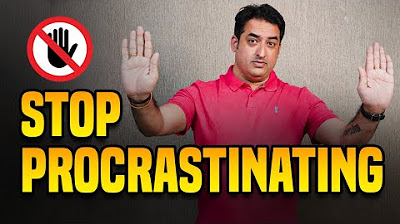How I Manage My Time - The System That Changed My Life
Summary
TLDRIn this productivity-focused video, the host addresses the common struggle of feeling overwhelmed by endless to-do lists and the misconception that time management is the key issue. Instead, they argue that energy management is crucial and introduces the concept of an 'Energy Investment Portfolio'—a method to categorize tasks into active and passive investments to optimize energy allocation. The video suggests capping active projects to avoid burnout and emphasizes the importance of embracing the finite nature of time and energy, aligning efforts with what truly matters.
Takeaways
- 😀 The video discusses overcoming the feeling of overwhelm in productivity by focusing on energy management rather than time management.
- 📈 The concept of an 'energy investment portfolio' is introduced as a method to manage energy by categorizing tasks and projects.
- 📋 The portfolio consists of a bucket list, active investments, passive income, and completed projects, helping to visually organize and prioritize tasks.
- 🎯 Active investments are tasks that require ongoing energy and attention, while passive income tasks are on autopilot or delegated to others.
- 🏋️♂️ The video emphasizes the importance of capping the number of active investments to avoid burnout, suggesting a range of three to seven projects.
- 🧠 It draws a parallel between investing money and investing energy, aiming for projects that compound and grow over time.
- 🌟 The idea of having 'something to look forward to' is highlighted as a key to happiness, with trips and experiences serving as examples.
- 🔗 The video mentions a Skillshare class on using Notion for productivity, sponsored content that ties into the energy investment portfolio concept.
- ⏰ The script points out that the number of active projects one can manage is similar to the cognitive limit on working memory, often around five plus or minus two.
- 🚫 The presenter expresses a preference for broad project goals over SMART goals, valuing flexibility and enjoyment over strict specificity.
Q & A
What is the main issue discussed in the video regarding time management?
-The main issue discussed is not the lack of time, but the feeling of overwhelm due to an endless list of things one wants to do and the difficulty in managing energy to accomplish them.
What does the speaker suggest as a solution to the problem of overwhelm?
-The speaker suggests finding ways to make the activities more energizing and managing one's energy through the concept of an 'energy investment portfolio'.
What is an 'energy investment portfolio' as described in the video?
-An 'energy investment portfolio' is a method of managing energy by categorizing tasks into active investments, passive income, and completed projects, similar to managing a financial portfolio.
How does the speaker use the term 'active investments' in the context of the energy investment portfolio?
-The speaker uses 'active investments' to refer to projects or tasks that require ongoing personal effort and energy, such as organizing singing lessons or podcast episodes.
What does the 'passive income' column in the energy investment portfolio represent?
-The 'passive income' column represents projects that are on autopilot or are being managed by someone else, requiring less active energy from the individual, such as going to the gym with a personal trainer.
Why does the speaker believe it's important to limit the number of active investments?
-The speaker believes it's important to limit the number of active investments to avoid overwhelm and burnout, and to ensure that each project receives adequate attention and energy.
What is the suggested number of active projects one should have according to the speaker?
-The speaker suggests that the number of active projects should be capped at around five plus or minus two, which aligns with the human working memory capacity.
How does the speaker use the energy investment portfolio to manage personal and work life?
-The speaker uses separate energy investment portfolios for personal and work life, tracking active investments and ensuring a balance that prevents burnout and maintains productivity.
What is the significance of the 'completed' column in the energy investment portfolio?
-The 'completed' column serves as a record of projects that have been successfully finished, providing a sense of accomplishment and helping to reallocate energy to new projects.
How does the speaker feel about the SMART goal setting approach?
-The speaker does not resonate with the SMART goal setting approach, preferring a more flexible and less rigid system that does not detract from the enjoyment of working on projects.
What is the main takeaway from the video in terms of productivity and time management?
-The main takeaway is embracing the finite nature of time and energy, focusing on managing energy effectively through an energy investment portfolio, and prioritizing a sustainable and enjoyable approach to productivity.
Outlines

此内容仅限付费用户访问。 请升级后访问。
立即升级Mindmap

此内容仅限付费用户访问。 请升级后访问。
立即升级Keywords

此内容仅限付费用户访问。 请升级后访问。
立即升级Highlights

此内容仅限付费用户访问。 请升级后访问。
立即升级Transcripts

此内容仅限付费用户访问。 请升级后访问。
立即升级浏览更多相关视频

Manajemen Waktu (Bangkitkan Motivasi Produktif)

To-Do Lists vs Time Blocking | Which is Better?

How to MASTER Task Management for Studying & Learning

The Truth Behind Why Trying Harder Doesn’t Work (When You Have ADHD)

Rahasia Orang Sukses dalam Manajemen Waktu

Stop Procrastinating | 13 Best Time Management Techniques | Increase Productivity #productivityhacks
5.0 / 5 (0 votes)
